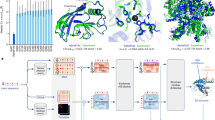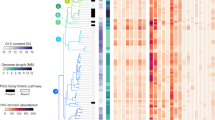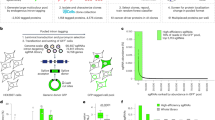Abstract
Selection of target substrates by protein kinases is strongly influenced by the amino acid sequence surrounding the phosphoacceptor site. Identification of the preferred peptide phosphorylation motif for a given kinase permits the production of efficient peptide substrates and greatly simplifies the mapping of phosphorylation sites in protein substrates. Here we describe a combinatorial peptide library method that allows rapid generation of phosphorylation motifs for serine/threonine kinases.
This is a preview of subscription content, access via your institution
Access options
Subscribe to this journal
Receive 12 print issues and online access
$259.00 per year
only $21.58 per issue
Buy this article
- Purchase on Springer Link
- Instant access to full article PDF
Prices may be subject to local taxes which are calculated during checkout


Similar content being viewed by others
References
Manning, G., Whyte, D.B., Martinez, R., Hunter, T & Sudarsanam, S. Science 298, 1912–1934 (2002).
Pinilla, C., Appel, J.R., Blanc, P. & Houghten, R.A. Biotechniques 13, 901–905 (1992).
Songyang, Z. Mol. Cell. Biol. 16, 6486–6493 (1996).
Nishikawa, K., Toker, A., Johannes, F.J., Songyang, Z. & Cantley, L.C. J. Biol. Chem. 272, 952–960 (1997).
Yaffe, M.B. et al. Nat. Biotechnol. 19, 348–353 (2001).
Meggio, F. & Pinna, LA. FASEB J. 17, 349–368 (2003).
Wu, J.J., Phan, H. & Lam, K.S. Bioorg. Med. Chem Lett. 8, 2279–2284 (1998).
Rychlewski, L., Kschischo, M., Dong, L., Schutkowski, M. & Reimer, U. J. Mol. Biol. 336, 307–311 (2004).
Rodriguez, M., Li, S.S., Harper, J.W. & Songyang, Z. J. Biol. Chem. 279, 8802–8807 (2004).
Luo, K., Zhou, P. & Lodish, H.F. Proc. Natl. Acad. Sci. USA 92, 11761–11765 (1995).
Massagué, J. Ann. Rev. Biochem. 67, 753–791 (1998).
Mikkers, H. et al. Nat. Genet. 32, 153–159 (2002).
Friedmann, M., Nissen, M.S., Hoover, D.S., Reeves, R. & Magnuson, N.S. Arch. Biochem Biophys. 298, 594–601 (1992).
Yan, B. et al. J. Biol. Chem. 278, 45358–45367 (2003).
Fox, C.J. et al. Genes Dev. 17, 1841–1854 (2003).
Acknowledgements
We thank N. Ahn for providing the active MKK1 clone and T. Obata for preparation of recombinant Akt used in pilot studies. This work was supported by US National Institutes Health grants GM56203 to L.C.C. and CA75134 to A.T. B.E.T. is a Leukemia and Lymphoma Society Special Fellow.
Author information
Authors and Affiliations
Corresponding author
Ethics declarations
Competing interests
The authors declare no competing financial interests.
Supplementary information
Rights and permissions
About this article
Cite this article
Hutti, J., Jarrell, E., Chang, J. et al. A rapid method for determining protein kinase phosphorylation specificity. Nat Methods 1, 27–29 (2004). https://doi.org/10.1038/nmeth708
Received:
Accepted:
Published:
Issue Date:
DOI: https://doi.org/10.1038/nmeth708
This article is cited by
-
Depletion of creatine phosphagen energetics with a covalent creatine kinase inhibitor
Nature Chemical Biology (2023)
-
Targets mapped for almost all human kinase enzymes
Nature (2023)
-
Synthetic design of farnesyl-electrostatic peptides for development of a protein kinase A membrane translocation switch
Scientific Reports (2021)
-
Rational Design of a Protein Kinase A Nuclear-cytosol Translocation Reporter
Scientific Reports (2020)
-
Regulation of folate and methionine metabolism by multisite phosphorylation of human methylenetetrahydrofolate reductase
Scientific Reports (2019)



